Overview of GreenWood
- The vision of renewable resources inspired the global growth and expansion of GreenWood.
- For a decade, GreenWood managed to build capacity with 70 employees, 20 investment opportunities in China, resources, and business networks.
- Challenges are erratic government policies, complex ownership of forestry, nascent farming systems, and cumbersome bureaucratic systems.
- Despite challenges, GreenWood secured two investment opportunities in China, Luxi and Dongji.
GreenWood was established in 1998 by Jeff Nuss with a global vision of creating sustainable resources through tree plantation to address global warming, provide alternative energy, and attain sustainable forestry. After 10 years of growth, GreenWood managed to build capacity with 70 employees, 20 investment opportunities in China, resources, and business networks, which propelled it to explore international markets (Light, 2015). However, the Chinese market posed some challenges due to erratic government policies, complex ownership of forestry, nascent farming systems, and cumbersome bureaucratic systems. Despite challenges, GreenWood secured two investment opportunities in China, Luxi and Dongji, where it achieved to demonstrate social responsibility, economic performance, and environmental stewardship in promoting sustainability of forestry.
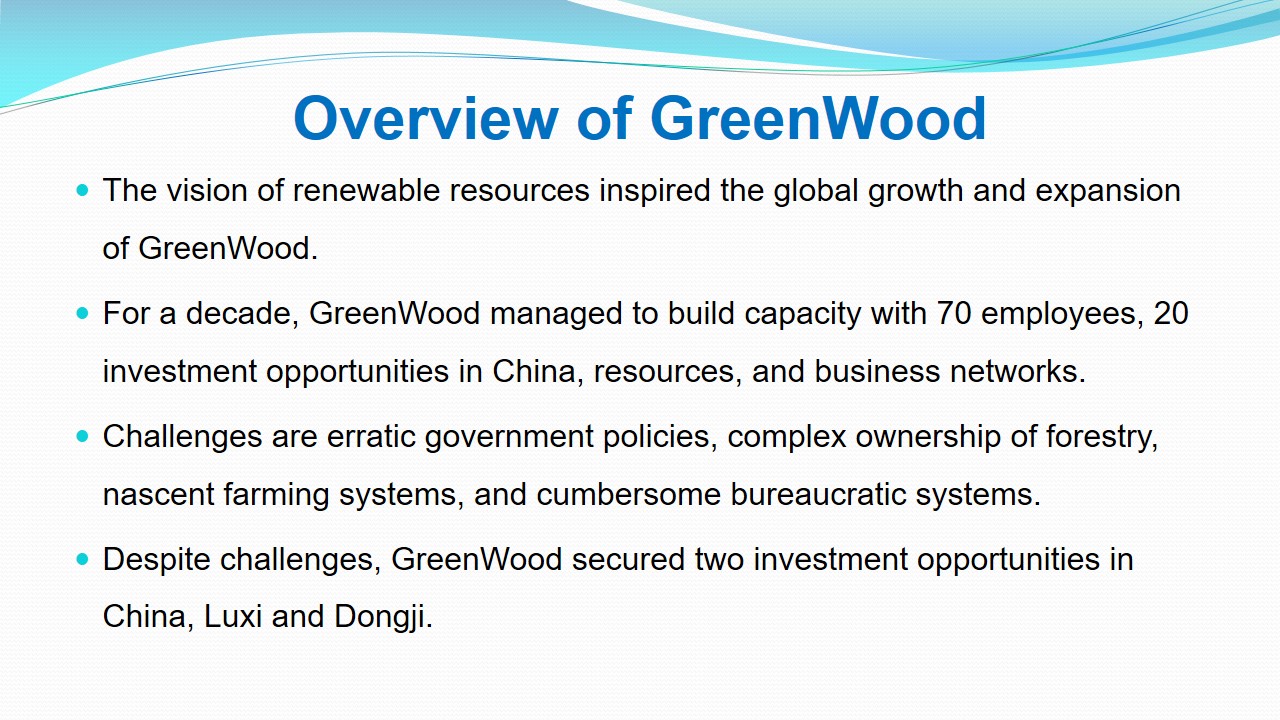
Reasons for International Expansion
- The limited market of poplar plantation in the United States made GreenWood to explore the international market.
- China provided a potential market for the poplar plantations due to an alarming rate of desertification and deforestation.
- The Chinese government plans to increase vegetation cover to 26% by planting trees on 65 million hectares of land.
- Growing demand for wood products and favorable government policies persuaded GreenWood to explore international markets.
The limited market of poplar plantation in the United States is one of the reasons that made GreenWood to explore the international market. With business connections, Jeff Nuss explored the Chinese market and noted the potential market for the poplar plantation. Over a decade, China had experienced an alarming rate of desertification and deforestation due to the excessive logging in its forestry, leading to a diminished supply of wood products. To overcome the problem of forest loss and desertification, the Chinese government launched a program to increase vegetation cover to 26% by planting trees on 65 million hectares of land (Light, 2015). So, the growing demand for wood products and favorable government policies persuaded GreenWood to explore international markets, which is limited in the United States.
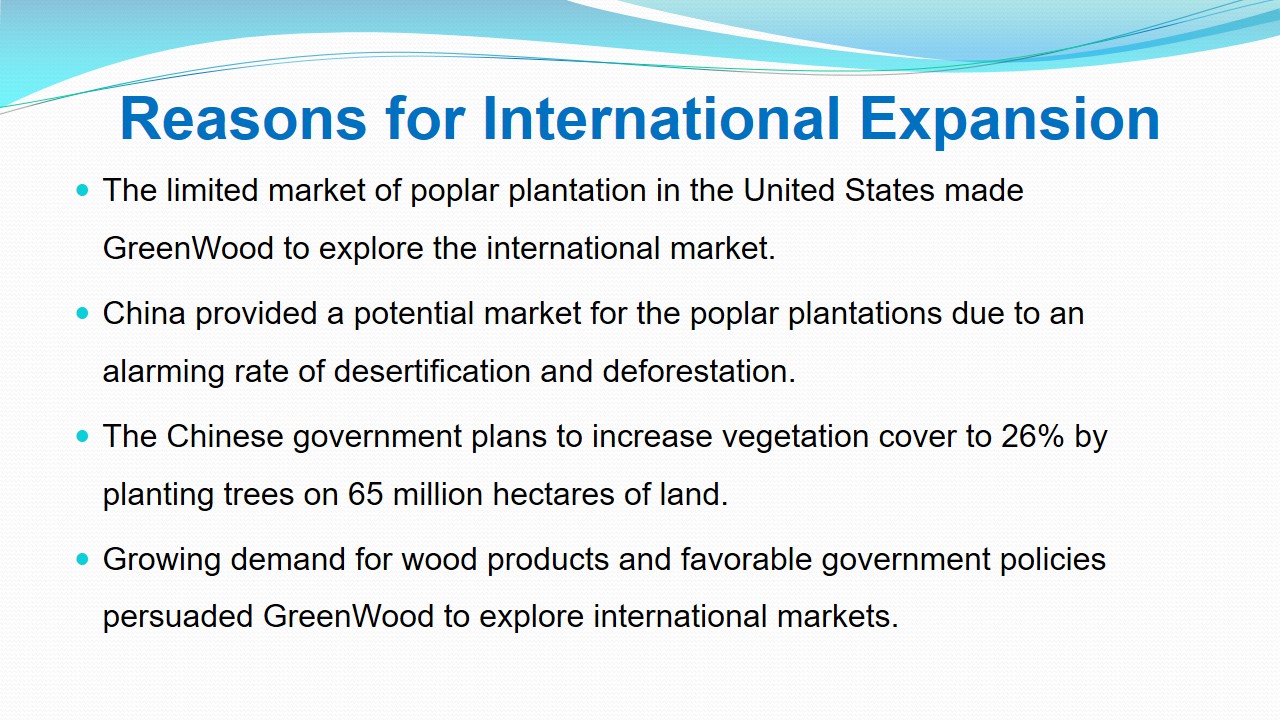
Entry Mode
- GreenWood entered the Chinese market using a wholly-owned subsidiary.
- In 2005, the management formed GreenWood Resources China to run operations in China.
- The subsidiary allowed GreenWood to control its operations with minimal interference from local companies and agents.
- GreenWood hired a local manager and raised funds to overcome the challenges of owning the subsidiary.
GreenWood entered the Chinese market using a wholly-owned subsidiary. After exploring the Chinese market and realizing its potential, the management formed GreenWood Resources China and established in Beijing. This mode of entry allowed GreenWood to control its operations with minimal interference from local companies and agents. To gain local talent and knowledge, GreenWood hired Brian Liu as the vice president of the subsidiary (Light, 2015). GreenWood overcame the need for high investments by raising capital to fund the subsidiary’s operations in China.
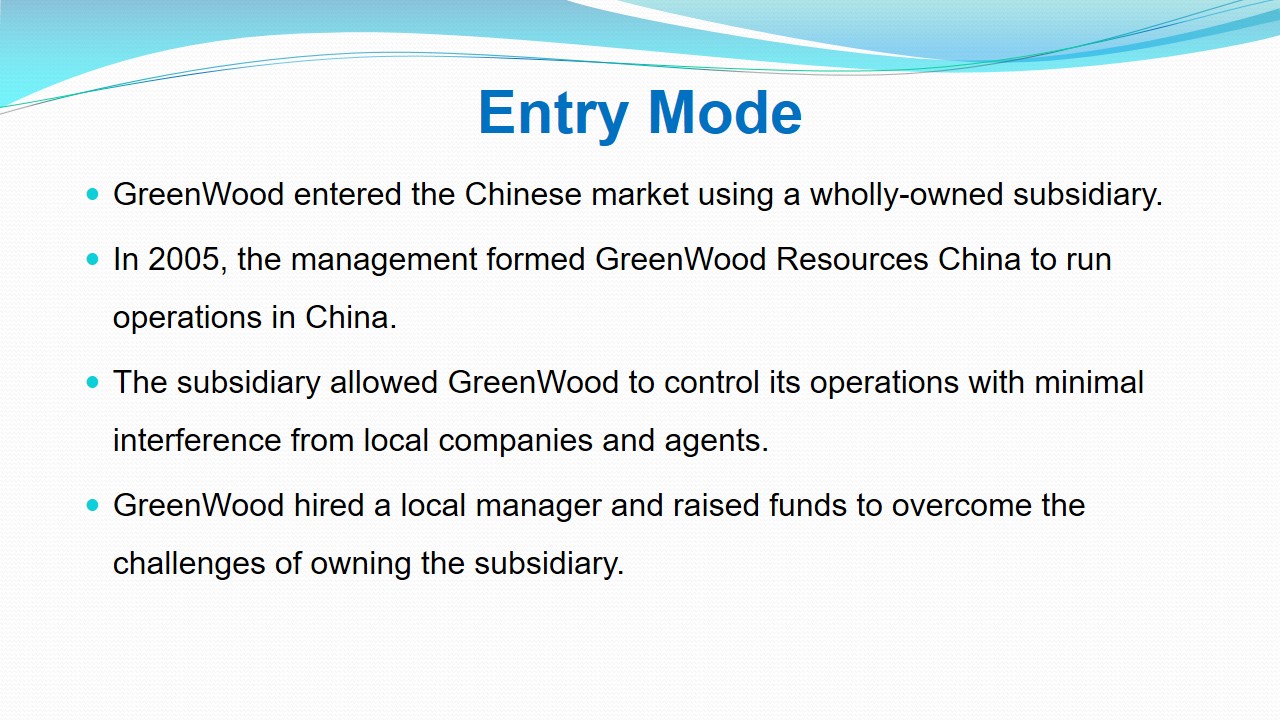
International Strategy
- GreenWood successfully ventured into the Chinese market and explored numerous investment opportunities.
- Between 2000 and 2005, GreenWood created networks with government agencies, academic institutions, and businesses in the forestry industry.
- The establishment of GreenWood Resources China to run operations in China.
- Through its major projects, Luxi and Dongji, GreenWood demonstrated its capability to manage and create sustainable resources in China.
GreenWood successfully ventured into the Chinese market and explored numerous investment opportunities. Between 2000 and 2005, Jeff Nuss and his management team made a series of business trips to China to create networks with government agencies, academic institutions, and businesses in the forestry industry. Subsequently, GreenWood established GreenWood Resources China to enable it to run operations in China. Through its major projects, Luxi and Dongji, GreenWood demonstrated its capability to manage and create sustainable resources in China.
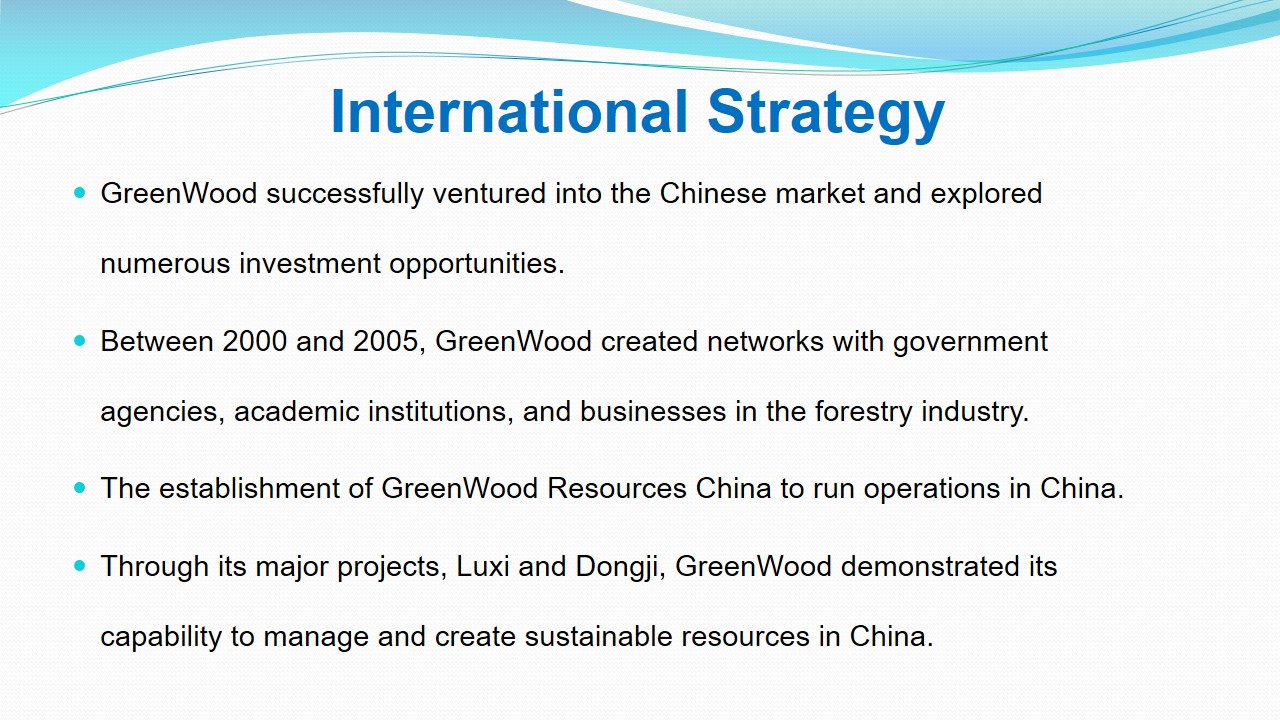
Strategies
- GreenWood utilized the offshore strategy to venture into the international markets.
- In the process of research and development of its products, GreenWood carried its plant materials to China.
- GreenWood used the offshore strategy to diffuse and adapt its products to the Chinese market.
- The development of varieties of trees that grow fast and generate high yields gave GreenWood a competitive advantage in the Chinese market.
The examination of the international expansion of GreenWood indicates that it utilized the offshore strategy. GreenWood carried its plant materials to China for research and development. The offshore strategy enabled GreenWood to diffuse and adapt its products to the Chinese market. The identification and production of varieties of poplar trees that grow fast and generate high yields gave GreenWood a competitive advantage in the Chinese market.
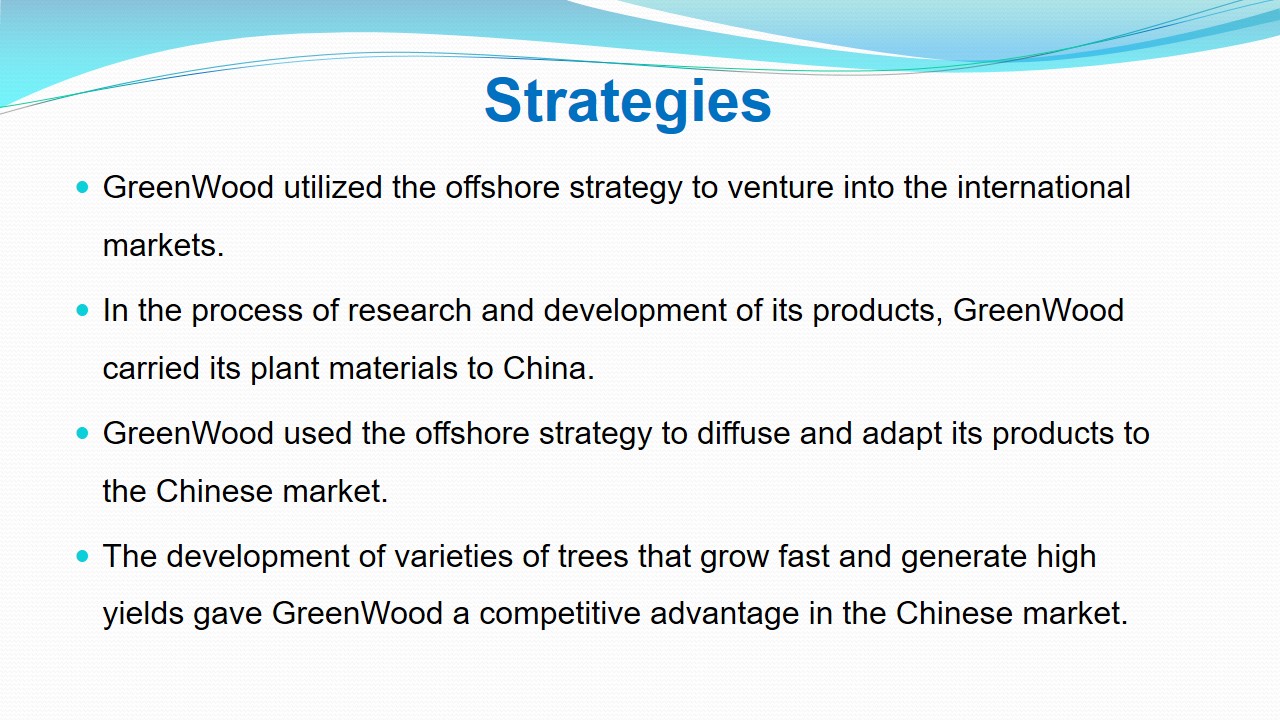
Entrepreneurial Strategies
- Explore Learning Opportunities:
- The exploration of the Chinese market highlighted opportunities in the forest industry.
- During business trips, the management understood market demands, the capacity for research and development, organizational processes, and managerial skills.
- Knowledge gained was applied in the customization of products and the valuation of target markets.
- Learning opportunities led to the identification of 20 potential projects and the procurement of two main projects.
Between 2000 and 2005, the management of GreenWood explored the Chinese market and noted its potentials in the forest industry. During business trips, the management assessed market demands, evaluated the capacity for research and development, learned about organizational processes, and gained managerial skills. The management of GreenWood was able to apply knowledge gained in China in the customization of products and the valuation of target markets. The outcomes of learning opportunities were the identification of 20 potential projects and the procurement of two main projects.
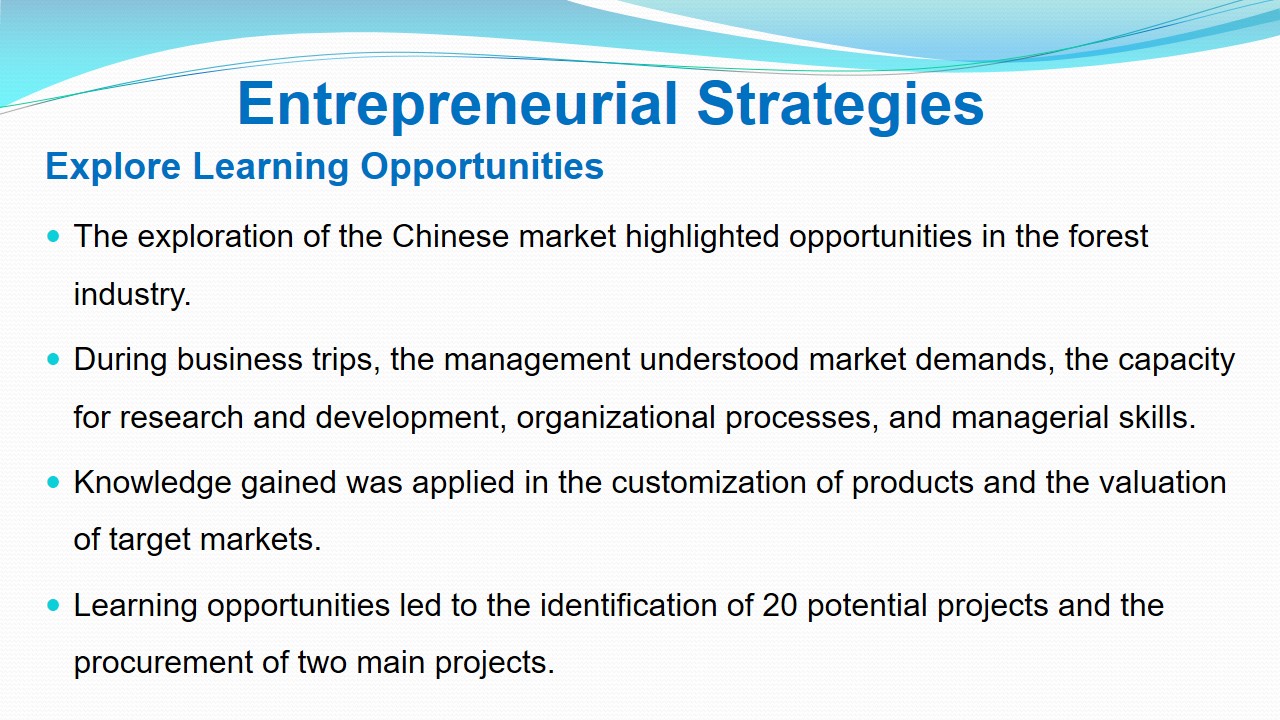
Taking Advantage of Arbitrage
- The inadequate market of wood products in the United States hindered the growth of GreenWood.
- The Chinese market opened avenues for GreenWood to take advantage of arbitrage.
- The demand for wood products is high because of excessive deforestation.
- The importation of poplar trees and the management of forests in China are lucrative for GreenWood.
The inadequate market of wood products in the United States hindered the growth of GreenWood. The exploration of the Chinese market opened avenues for GreenWood to take advantage of arbitrage. In China, there was a high demand for wood products due to excessive deforestation. The importation of poplar trees and the management of forests in China are lucrative for GreenWood.
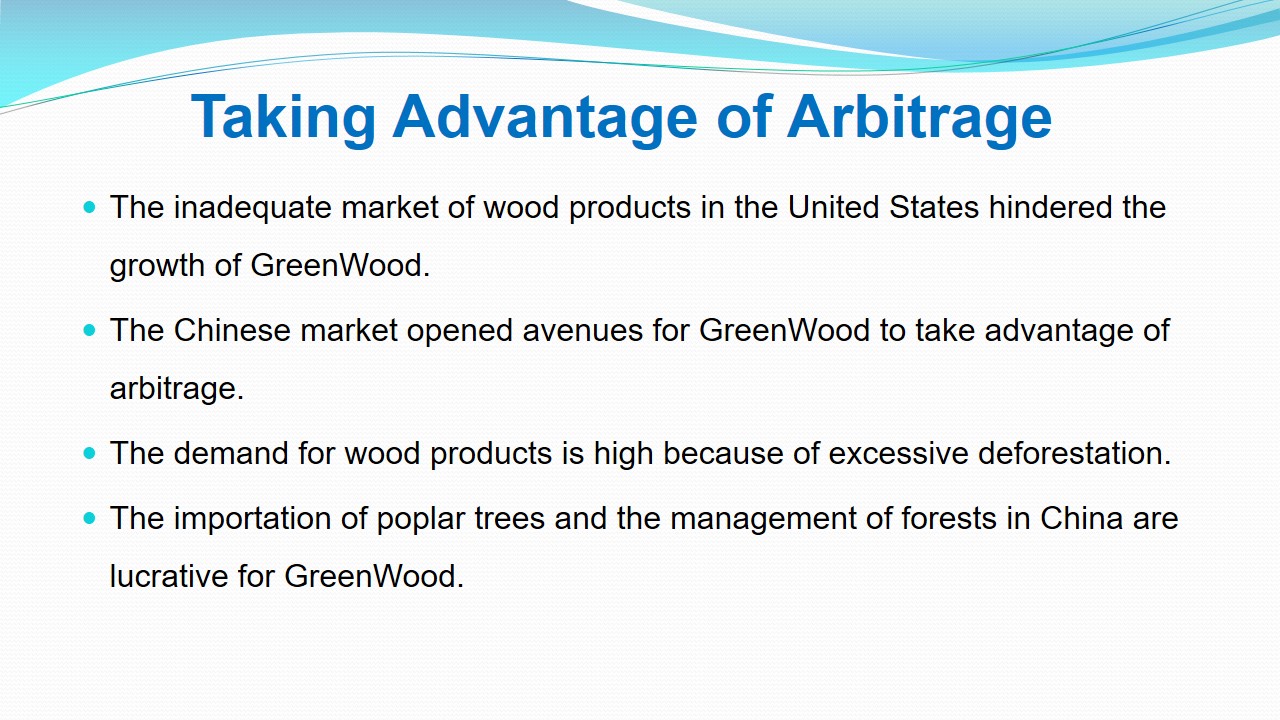
Entrepreneurial Leadership
- Jeff Nuss demonstrated entrepreneurial leadership in the way he managed GreenWood.
- Despite GreenWood taking years to takeoff, Jeff Nuss remained persistent while exploring opportunities in the global market.
- The management focused on the Chinese market and remained open to experience.
- Challenges in the Chinese market did not deter management from exploring business opportunities.
In the management of GreenWood, Jeff Nuss demonstrated entrepreneurial leadership. Despite the company taking more than ten years to take off, Jeff Nuss remained persistent as he explored opportunities in the global market. In the quest to turnaround the performance of GreenWood, the management focused on the Chinese market and remained open to experience. Challenges in the Chinese market, such as the cumbersome bureaucratic process, complex ownership of land, and dynamic policies, did not deter the management from exploring business opportunities.
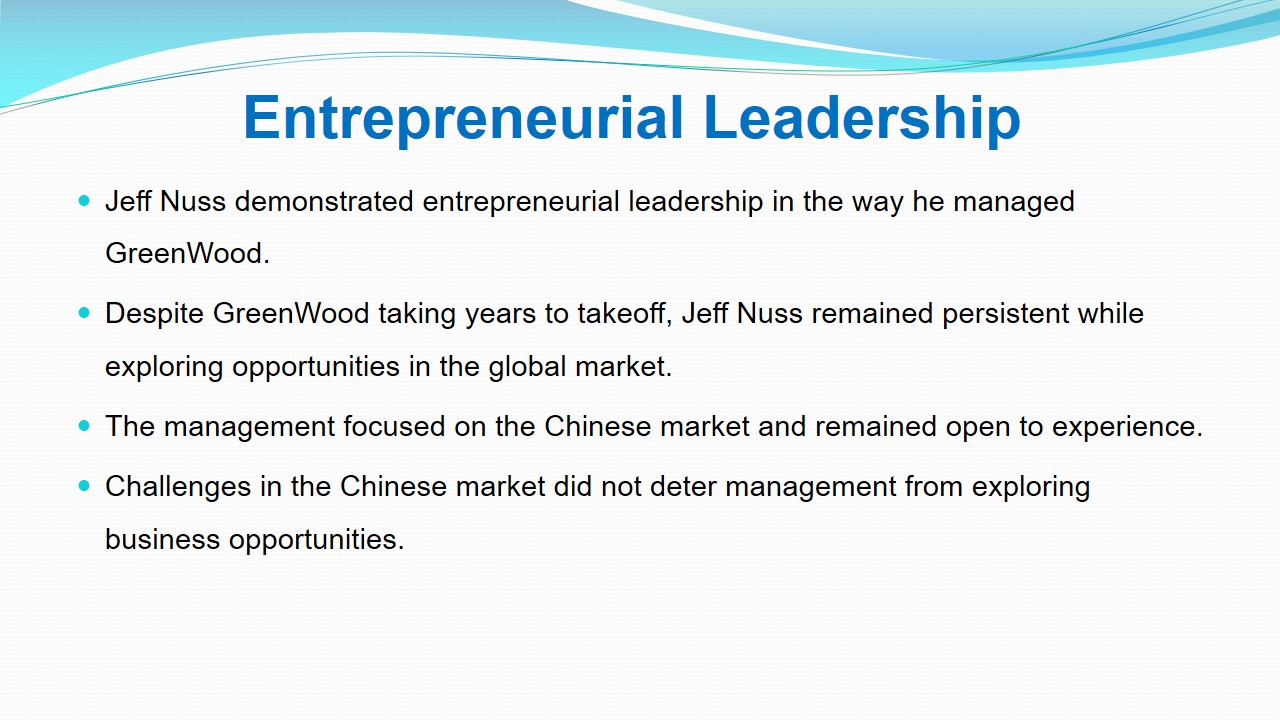
Optimization of Social Capital
- GreenWood exploited its social capital to expand into the global market.
- Jeff Nuss and the management team made effective connections that provided an opportunity for them to explore the Chinese market.
- GreenWood gained an understanding of the Chinese market and business practices.
- The social connections led to the successful establishment of the subsidiary in China.
To expand into the global market, GreenWood exploited its social capital. Jeff Nuss and the management team capitalized on their social network in making useful connections that provided an opportunity for exploring the Chinese market. The social connections enabled the GreenWood to understand the Chinese market and appropriate business practices. Moreover, the social connections led to the successful establishment of the subsidiary to manage the business operations of GreenWood in China.
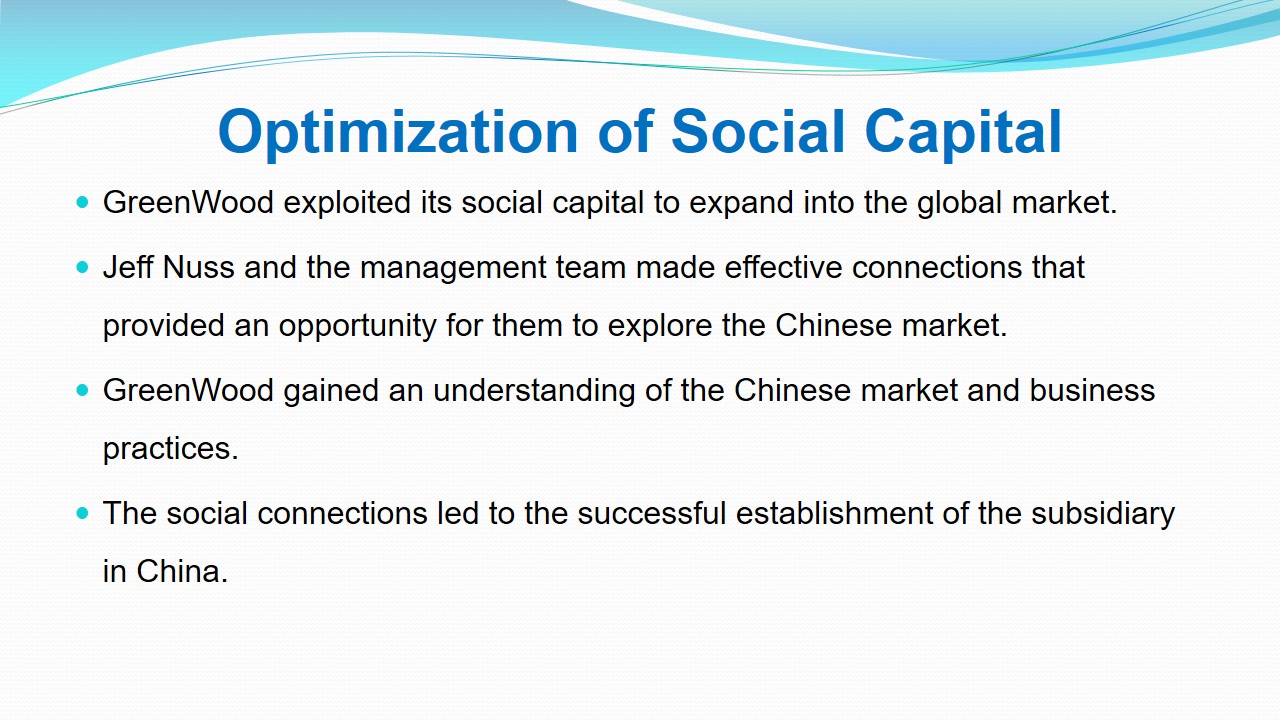
Pioneering New Entry
- Based on its global vision, GreenWood aims to provide innovative product to the forest industry.
- GreenWood uses high-yielding and fast-growing trees to address issues of global warming, alternative energy, and sustainability of forests.
- GreenWood pioneered to alleviate the demand for wood products through sustainable forestry.
- The uniqueness of products that GreenWood offers increases its competitive advantage in the Chinese market.
Based on its global vision, GreenWood aims to provide innovative product to the forest industry. GreenWood seeks to address global warming, provide alternative energy, and promote sustainability of forests using high-yielding and fast-growing trees. Given that the Chinese experience the problem of deforestation and desertification, GreenWood pioneered to undertake not only afforestation that alleviates the demand for wood products sustainably. The uniqueness of products that GreenWood offers increases its competitive advantage in the Chinese market.

Management Expertise
- Jeff Nuss persuaded the family office to purchase a poplar plantation.
- The management of the plantation enhanced expertise in breeding poplar trees.
- Marketing and sale of the poplar plantation empowered GreenWood to differentiate its products.
- Jeff Nuss pooled experts from various fields who strengthened the expertise of the management team of GreenWood.
With the expertise in forestry, Jeff Nuss persuaded the family office to purchase a poplar plantation. The purchase made GreenWood manage the plantation and gained expertise in breeding poplar trees. GreenWood enhanced its stature in the management of forests when it marketed and sold the poplar plantation. The experience of the management and sale of the plantation empowered GreenWood to differentiate its products into management, tree improvement, farming operations, and ecosystem services. Jeff Nuss pooled experts, such as Dr. Brian Shanton and Hunter Brown, and Brian Liu (Light, 2015), from various fields who strengthened the expertise of the management team of GreenWood.
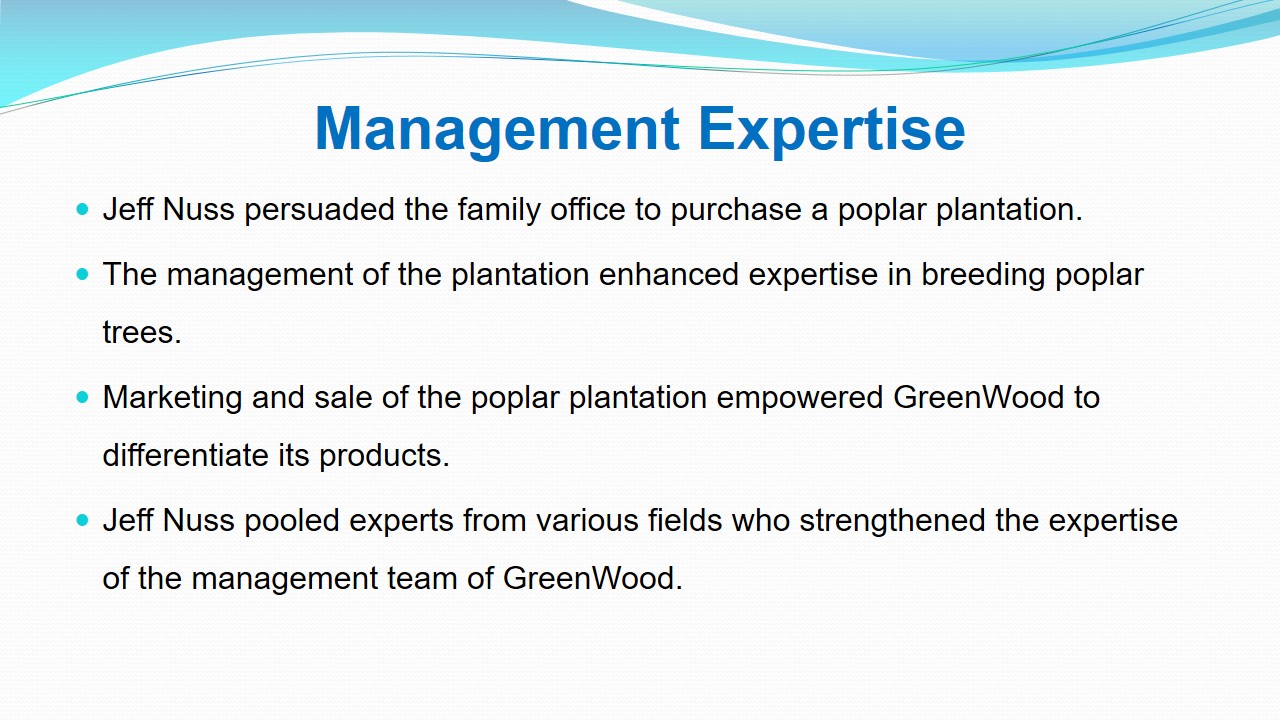
Fund-Raising Strategy
- To attract investors, GreenWood acquired Potlatch’s farm in Oregon.
- Jeff Nuss and business partners established GreedWood Tree Farm Fund and raised $175 million.
- The acquisition attracted an investment of $200 million from Oriental Timber Fund Limited
- The ability of Jeff Nuss to raise funds saved the company from collapsing and attracted significant investors.
When GreenWood was struggling with financial issues, Jeff Nuss exploited an acquisition opportunity. To attract investors, GreenWood acquired Potlatch’s farm in Oregon. Jeff Nuss and business partners established GreedWood Tree Farm Fund and raised $175 million, which they used to purchase Potlatch’s farm. The acquisition placed GreenWood as a prominent actor in the forest industry, making it attract investment of $200 million from Oriental Timber Fund Limited (Light, 2015). The ability of Jeff Nuss to raise funds saved the company from collapsing and attracted significant investors.
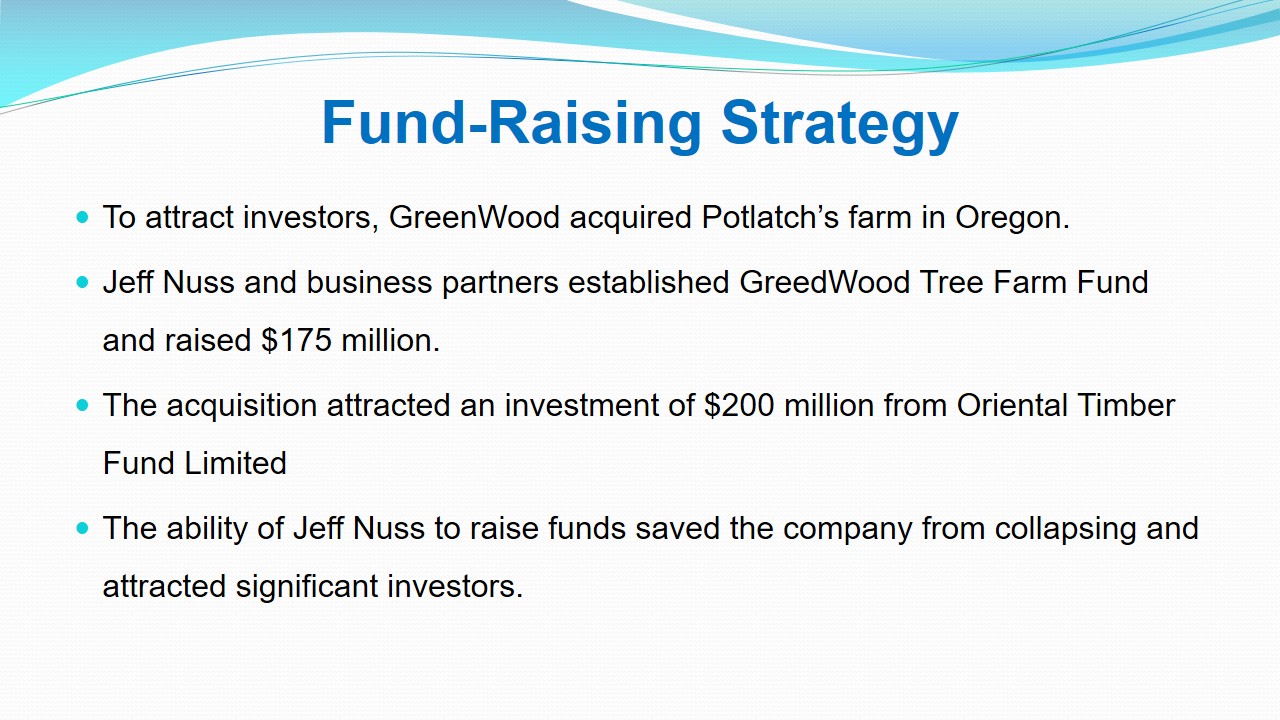
Reference
Light, L. (Ed.). (2015). GreenWood Resources: A global sustainable venture in the making. Wall Street Journal, C32-C44.